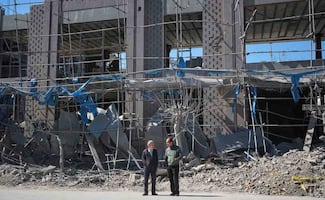Más Información

SRE reporta 321 mexicanos evacuados ante conflicto en Medio Oriente; no hay afectados en su integridad

México presenta protesta diplomática por muerte de mexicano bajo custodia migratoria en EU; se apoya a la familia, dice Sheinbaum

Venta del 24% de Banamex fue el día del operativo contra “El Mencho” y nadie dudó: Chico Pardo; destaca la confianza en México

Cae "Tobolio", líder de célula delictiva “El 19”, del Cártel de Sinaloa; cuenta con orden de arresto en EU

México debe eliminar la prisión preventiva oficiosa: Comité de ONU; señala violación de derechos de 22 mujeres en CEFERESO 16
During the first half of 2017, the epidemiology watch report in Mexico registered 3,260 new cases of HIV and 2,260 of AIDS in the country, which makes the estimated total of people living with HIV/AIDS in Mexico a little over 144,000, according to the General Direction of Epidemiology and the National Center for the Control and Prevention of HIV & AIDS (CENSIDA).
However, it is believed 30 or 40% of people with VIH/AIDS are still unaware they have contracted the disease, according to Pablo Belaunzarán, researcher at the National Institute of Medical Sciences and Nutrition Salvador Zubbirán.
The specialists said this percentage is equal to 100,000 people, which makes timely diagnosis one of the biggest challenges Mexico has to face in the battle against the deadly virus.
According to the World Health Organization (WHO) , almost 1.8 million people contracted HIV last year worldwide, which means a decrease of 39% compared to the 3 million of people who became infected during the late 90's. Nevertheless, this organization also highlighted HIV cases are increasing at an accelerated rate in countries which have problems expanding their health services to meet the demands of their growing population.
“Another issue is that HIV tests are only available through health services while other countries are trying to use other strategies to offer tests in pharmacies or provide them directly to vulnerable communities, similarly to pregnancy tests.”
On this regard, the Center for Scientific Research and Higher Education of Ensenada presented a project to develop a quick low-cost HIV tests which could become a solid solution.
For Belaunzarán, the best case scenario would be the diagnosis of 90% to 100% of all the people infected because then the sick would receive treatment and would also stop infecting others.
The researcher explains the lack of access to health services is also another factor to consider. In Mexico City, mortality rates have lowered but in other states, like Tabasco, figures have gone up, so while there've been changes, figures remain constant since 1995 – that is, 4 to 5,000 people die of AIDS in Mexico every year .
According to the Ministry of Public Health, the state with the highest number of cases is Tabasco , followed by Campeche, Yucatán, Colima , and Veracruz .
According to data from UNAIDS , researchers have shown people living with HIV who adhere to an effective antiretroviral treatment have 97% less probability of transmitting the virus to others.
After the first cases began to be diagnosed, over 30 years ago, HIV/AIDS treatments have quickly evolved; however, creating a drug which can cure or eradicate the virus is no easy task, given that, during the life cycle of the virus, it becomes part of the human DNA.
On the eve of the World AIDS Day, celebrated every December 1, scientific groups of researchers continue their researches in all corners of the world to develop a vaccine which can prevent contracting HIV .
“In recent years, there's been an expectation of [having a vaccine] in the upcoming five or ten years but they need to be highly effective to be produced,” added Belaunzarán
For the specialist, a vaccine is certainly needed yet in the meantime, our best option to fight this virus is a timely diagnosis and treatment.
am
Noticias según tus intereses
[Publicidad]
[Publicidad]









